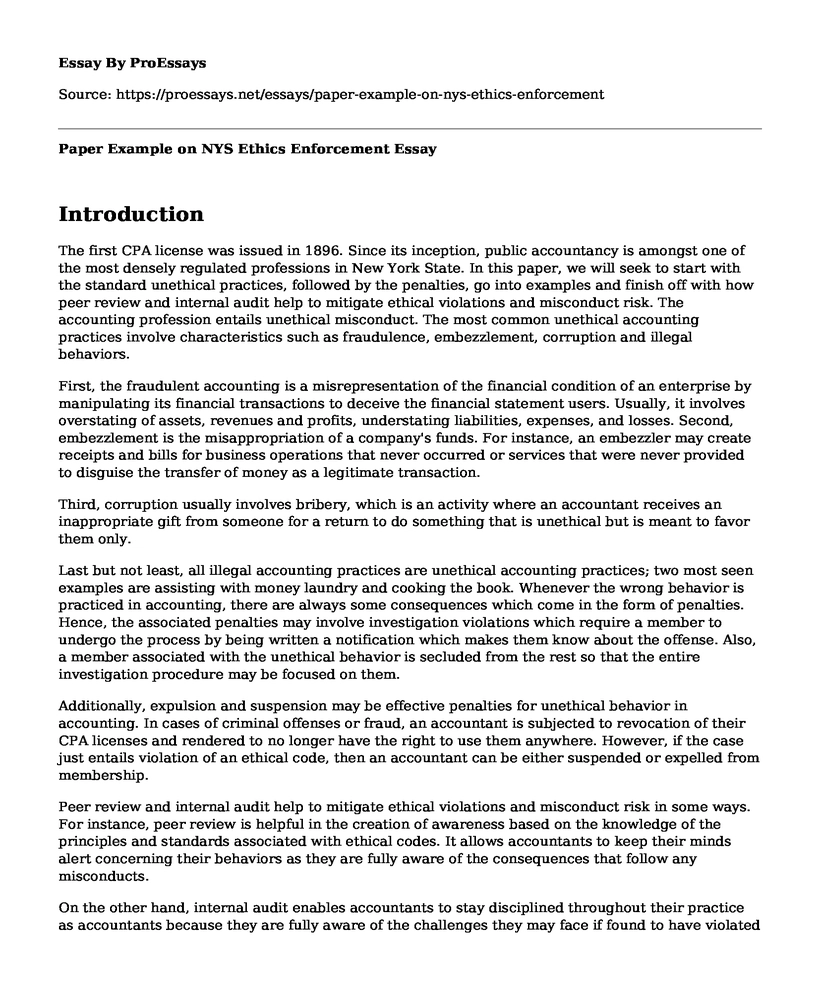Introduction
The first CPA license was issued in 1896. Since its inception, public accountancy is amongst one of the most densely regulated professions in New York State. In this paper, we will seek to start with the standard unethical practices, followed by the penalties, go into examples and finish off with how peer review and internal audit help to mitigate ethical violations and misconduct risk. The accounting profession entails unethical misconduct. The most common unethical accounting practices involve characteristics such as fraudulence, embezzlement, corruption and illegal behaviors.
First, the fraudulent accounting is a misrepresentation of the financial condition of an enterprise by manipulating its financial transactions to deceive the financial statement users. Usually, it involves overstating of assets, revenues and profits, understating liabilities, expenses, and losses. Second, embezzlement is the misappropriation of a company's funds. For instance, an embezzler may create receipts and bills for business operations that never occurred or services that were never provided to disguise the transfer of money as a legitimate transaction.
Third, corruption usually involves bribery, which is an activity where an accountant receives an inappropriate gift from someone for a return to do something that is unethical but is meant to favor them only.
Last but not least, all illegal accounting practices are unethical accounting practices; two most seen examples are assisting with money laundry and cooking the book. Whenever the wrong behavior is practiced in accounting, there are always some consequences which come in the form of penalties. Hence, the associated penalties may involve investigation violations which require a member to undergo the process by being written a notification which makes them know about the offense. Also, a member associated with the unethical behavior is secluded from the rest so that the entire investigation procedure may be focused on them.
Additionally, expulsion and suspension may be effective penalties for unethical behavior in accounting. In cases of criminal offenses or fraud, an accountant is subjected to revocation of their CPA licenses and rendered to no longer have the right to use them anywhere. However, if the case just entails violation of an ethical code, then an accountant can be either suspended or expelled from membership.
Peer review and internal audit help to mitigate ethical violations and misconduct risk in some ways. For instance, peer review is helpful in the creation of awareness based on the knowledge of the principles and standards associated with ethical codes. It allows accountants to keep their minds alert concerning their behaviors as they are fully aware of the consequences that follow any misconducts.
On the other hand, internal audit enables accountants to stay disciplined throughout their practice as accountants because they are fully aware of the challenges they may face if found to have violated the code of conduct. This is because the role of internal audit within an organization is to ensure the internal operations of a company stay under control and no unethical practices are reflected, however.
Conclusion
In conclusion, proper ethical behavior allows the accountants' interests and principles to be safeguarded by a company so that whenever they violate any of the rules, appropriate processes may be undertaken to solve the problem.
Cite this page
Paper Example on NYS Ethics Enforcement. (2022, Jun 02). Retrieved from https://proessays.net/essays/paper-example-on-nys-ethics-enforcement
If you are the original author of this essay and no longer wish to have it published on the ProEssays website, please click below to request its removal:
- Course Work on Company's Finance and Accounting
- Managed Health Care in America Essay
- American Military Evolution During Different Wars of 19-20 Centuries Paper Example
- Rational Response to an Irrational Society Paper Example
- Essay Example on Close Relationships: Defined by Interdependence and Craved by Humans
- Culture: Embracing Unique Identities for Social Bonding - Research Paper Sample
- Essay Example on How Creditable, Thoughtful Research Can Benefit All Areas of Society







